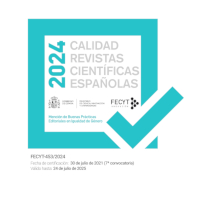“Uninhabited paradise” by Ana María Matute: a singular late style from childhood as origin
DOI:
https://doi.org/10.18172/cif.3887Keywords:
Ana María Matute, “Paraíso inhabitado”, childhood, memory, time, poetry, late style, deathAbstract
The last novel published by Ana María Matute, Paraíso inhabitado (2008), delves into the crucial elements of the world of childhood, such as the importance of imagination, the discovery of one's own identity and the progressive confrontation with the world, from a double perspective: that of the Adriana girl and that of the voice of the older narrator, who returns to the most intimate memories of her childhood. This double perspective, which accentuates an obsession with time in writing, shows how the authorial authority sheds light on its intimate relationship with literary creation, that is, also with its own genealogy as a writer, immersing itself in the power of revelation, tearing and invention inherent in the most perennial inner experiences of childhood, and this by confronting at the same time the unavoidable question of the end, both in life and in a literary work.
Downloads
References
ADORNO, T. W. (2003). Moments musicaux. Genève: Contrechamps. Traducción francesa de M. Kaltenecker. DOI: https://doi.org/10.4000/books.contrechamps.1049
BÓRQUEZ, N. (2011). “Memoria, infancia y guerra civil: el mundo narrativo de Ana María Matute”. Olivar 16: 159-177.
CAÑETE OCHOA, J. et al. (Coords.) (2011). La palabra mágica de Ana María Matute. Premio Cervantes 2010. Alcalá de Henares: Universidad de Alcalá.
GAZARIAN-GAUTIER, M.-L. (1997). Ana María Matute. La voz del silencio. Madrid: Espasa Calpe.
GRACIA, J. y RÓDENAS, D. (2011). Historia de la literatura española. Derrota y restitución de la modernidad (1939-2010). Barcelona: Crítica.
LAFONT, S. (2012). “Avant-propos” en Récits et dispositifs d’enfance (XIXè-XXIè siècles). (Coord. L. Lafont). Montpellier: Presses universitaires de la Méditerranée: 7-26.
LLORED, Y. (2009). “Escritura, memoria y olvido en Telón de boca de Juan Goytisolo” en Pesquisas en la obra de Juan Goytisolo. (Coords. B. Adriaensen y M. Kunz). Amsterdam-New York: Rodopi-Brill: 191-212. DOI: https://doi.org/10.1163/9789042028999_010
MATUTE, A. M. (1998). En el bosque. Madrid: Real Academia Española.
MATUTE, A. M. (2008). Paraíso inhabitado. Barcelona: Destino.
MATUTE, A. M. (2014). Luciérnagas. (Ed. de María Luisa Sotelo Vázquez). Madrid: Cátedra.
MATUTE, A. M. (2014). Demonios familiares. Barcelona: Planeta.
MERLO-MORAT, P. (2017). Ana María Matute. Paraíso inhabitado. Neuilly: Atlande.
PAOLI, A. (2017). “Paraíso inhabitado: miroir d’une trajectoire narrative aux multiples facettes” en Vers le paradis inhabité d’Ana María Mature. (Coords. N. Noyaret e I. Prat). Binges: Orbis Tertius: 13-43.
PEDRAZA, P. (2014). “Ana María Matute o las ficciones de la pena”. Claves de Razón Práctica 236: 166-175.
PONS BALLESTEROS, M. (2009). “El paraíso inhabitado de Ana María Matute: entre la realidad y la fantasía”. Tavira 25: 209-223.
PRINCE, N. (2012). “Lectures pour l’enfant, lectures de l’enfant” en Enfance et littérature. (Coord. V. Gély). París: SFLGC: 129-152.
ROMANO, C. (2012). L’événement et le temps. París: PUF. DOI: https://doi.org/10.3917/puf.roman.2012.01
SAID, E. W. (2012). Du style tardif. Arles: Actes Sud. Traducción francesa de M.-V. Tran Van Khai.
SANTA-CRUZ, M. (2014). “Un autre monde est-il possible ? Paraíso inhabitado d’Ana María Matute”. Bulletin Hispanique 116 (2): 549-561. DOI: https://doi.org/10.4000/bulletinhispanique.3377
Downloads
Published
How to Cite
Issue
Section
License
The authors retain copyright of articles and authorize CIF the first publication. They are free to share and redistribute the article without obtaining permission from the publisher as long as they give appropriate credit to the editor and the journal.
Self-archiving is allowed too. In fact, it is recommendable to deposit a PDF version of the paper in academic and/or institutional repositories.
It is recommended to include the DOI number.
This journal is licensed under a Creative Commons Attribution 4.0 International License














